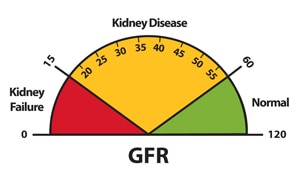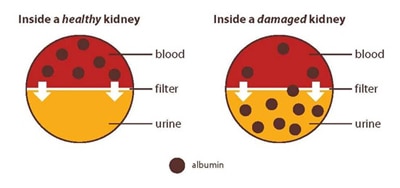Chronic Kidney Disease Tests & Diagnosis
How can I tell if I have kidney disease?
Early kidney disease usually doesn’t have any symptoms. Testing is the only way to know how well your kidneys are working. Get checked for kidney disease if you have
- diabetes
- high blood pressure
- heart disease
- a family history of kidney failure
If you have diabetes, get checked every year. If you have high blood pressure, heart disease, or a family history of kidney failure, talk with your health care provider about how often you should get tested. The sooner you know you have kidney disease, the sooner you can get treatment to help protect your kidneys.

What tests do doctors use to diagnose and monitor kidney disease?
To check for kidney disease, health care providers use
- a blood test that checks how well your kidneys are filtering your blood, called GFR. GFR stands for glomerular filtration rate.
- a urine test to check for albumin. Albumin is a protein that can pass into the urine when the kidneys are damaged.
If you have kidney disease, your health care provider will use the same two tests to help monitor your kidney disease and make sure your treatment plan is working.
Watch a video on how to check for kidney disease.
Blood test for GFR
Your health care provider will use a blood test to check your kidney function. The results of the test mean the following:
- a GFR of 60 or more is in the normal range. Ask your health care provider when your GFR should be checked again.
- a GFR of less than 60 may mean you have kidney disease. Talk with your health care provider about how to keep your kidney health at this level.
- a GFR of 15 or less is called kidney failure. Most people below this level need dialysis or a kidney transplant. Talk with your health care provider about your treatment options.

You can’t raise your GFR, but you can try to keep it from going lower. Learn more about what you can do to keep your kidneys healthy.
Creatinine. Creatinine is a waste product from the normal breakdown of muscles in your body. Your kidneys remove creatinine from your blood. Providers use the amount of creatinine in your blood to estimate your GFR. As kidney disease gets worse, the level of creatinine goes up.
Urine Test for Albumin
If you are at risk for kidney disease, your provider may check your urine for albumin.
Albumin is a protein found in your blood. A healthy kidney doesn’t let albumin pass into the urine. A damaged kidney lets some albumin pass into the urine. The less albumin in your urine, the better. Having albumin in the urine is called albuminuria.

A health care provider can check for albumin in your urine in two ways:
Dipstick test for albumin. A provider uses a urine sample to look for albumin in your urine. You collect the urine sample in a container in a health care provider’s office or lab. For the test, a provider places a strip of chemically treated paper, called a dipstick, into the urine. The dipstick changes color if albumin is present in the urine.
Urine albumin-to-creatinine ratio (UACR). This test measures and compares the amount of albumin with the amount of creatinine in your urine sample. Providers use your UACR to estimate how much albumin would pass into your urine over 24 hours. A urine albumin result of
- 30 mg/g or less is normal
- more than 30 mg/g may be a sign of kidney disease
If you have albumin in your urine, your provider may want you to repeat the urine test one or two more times to confirm the results. Talk with your provider about what your specific numbers mean for you.
If you have kidney disease, measuring the albumin in your urine helps your provider know which treatment is best for you. A urine albumin level that stays the same or goes down may mean that treatments are working.
How do I know if my kidney disease is getting worse?
You can keep track of your test results (PDF, 262 KB) over time. You can tell that your treatments are working if your
- GFR stays the same
- urine albumin stays the same or goes down
Your health care provider will work with you to manage your kidney disease.
This content is provided as a service of the National Institute of Diabetes and Digestive and Kidney Diseases
(NIDDK), part of the National Institutes of Health. NIDDK translates and disseminates research findings to increase knowledge and understanding about health and disease among patients, health professionals, and the public. Content produced by NIDDK is carefully reviewed by NIDDK scientists and other experts.

